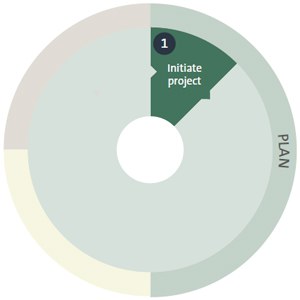Part 3: Initiating a procurement project
 3.1
3.1
Our previous work has shown us that the early stages of planning for a procurement are critical to its success. The first stage of a procurement life cycle is initiating the project. In this stage, it is important that:
- public organisations take a strategic approach, that is, a proposed procurement aligns with the organisation's priorities and business objectives;
- appropriate governance arrangements are put in place; and
- public organisations have people with the appropriate skills and experience and any conflicts of interest are addressed.
Procurement needs a strategic approach
3.2
It is important that a proposed procurement aligns with the organisation's priorities, business objectives, and strategic outcomes. At an early stage, organisations need to take a strategic view of their procurement and determine how it fits with their broader objectives.
3.3
If procurement is integral to a public organisation's overall business strategy, the organisation should prepare a procurement strategy. If procurement is not integral, a public organisation should at least be able to demonstrate:
- a knowledge of the type, value, and risk associated with the goods and services it procures; and
- that policies and procedures are in place to ensure that staff who are involved in procurement activity use good procurement principles and practices.
3.4
Failing to understand the strategic importance of a proposed procurement can lead to poor results, as we have seen in previous audit work. For example, in our 2010 report Spending on supplies and services by district health boards: Learning from examples, we noted that district health boards needed to have more knowledge about which supplies and services were needed and why.
Forming governance arrangements
3.5
Effective governance is needed for overseeing major procurements. For the procurement to be successful, public organisations need to clarify roles, responsibilities, and processes for decision-making, ownership, and oversight, at the start of the procurement life cycle.
3.6
Many of the problems we have seen with procurement have stemmed from poor governance arrangements.
Getting people with the right skills and experience
3.7
Gaps in staff capability can pose a significant risk. Public organisations should consider whether they have people with the right expertise for procurement on a case-by-case basis. If they do not, then they should consider seeking external expertise. Getting the right expertise is particularly important for large procurement projects.
Identifying and managing conflicts of interest
3.8
Our work sometimes shows that conflicts of interest are not always properly identified or managed during the procurement process. There are also variations in how well organisations understand the importance and practices of declaring, assessing, and managing conflicts of interest during a procurement.
3.9
Not all conflicts of interest will be apparent at the start of a procurement process. Some might come up at a later stage. It is important that public organisations remain mindful of conflicts of interest throughout the procurement process.
Our proposed audit work
3.10
Our audit work has shown us that making the right start to a procurement is critical to its success. This includes ensuring that those involved in the procurement are suitably qualified and skilled, and that the appropriate governance arrangements have been adopted.
3.11
Procurement capability is still an issue for public organisations. Having the right capability is important for a procurement to be done well, generating favourable procurement outcomes, and making best use of the resources available. It also supports good investment decisions. Conversely, poor capability can result in wasted resources, unfair practices, a lack of transparency, and frustration for suppliers. Our intended work on MBIE as a functional leader (see Part 2) will look at how well it has addressed capability issues.
3.12
Local councils have a vital role in providing infrastructure, facilities, and services to their communities. This often means contracting third parties for a variety of goods and services, such as construction, technology, waste collection, and public transport. To do this well, local councils need people with the right skills to advise, manage, and make decisions about what to buy, how to buy it, and how to make sure they are getting what they have paid for.
| Using a case-study approach, we intend to examine a small selection of procurements by local councils to highlight the importance of procurement capacity and capability and identify matters that local councils should focus on to reduce the risk of procurement failures. |
3.13
Our work has also illustrated some issues with public organisations not undertaking a strategic approach to procurement, including in the health sector.
3.14
District health boards currently own more than $6 billion worth of assets, with an estimated replacement value of more than $16 billion. A significant proportion of these assets are hospital buildings. Existing facilities are not sufficient to meet future service demand in some areas, and much of the existing building portfolio is ageing and will need replacing in the next 20 years. Replacing existing facilities and creating more facilities will involve procurement and is likely to cost several billion dollars.12
3.15
New Zealand's healthcare system can be effective only with the right infrastructure. The large investment required increases risk, which must be managed through an effective strategy, planning, governance, as well as management of contracts, projects, and relationships. The current arrangements for hospital building projects are relatively new and are still developing, so there is an opportunity for us to provide an early and useful external review.
| We intend to examine significant investments in the health sector. We are interested in how the health system determines what infrastructure investments are needed, where, and when. In subsequent years, we will also consider whether there is merit in looking at other aspects of significant procurement in the health sector either as part of our annual audits or as part of other projects. |
12: Office of the Auditor-General (2018), Health sector: Results of the 2016/17 audits.

